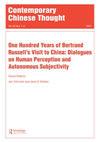儒家自由主义对“新儒家宗教”的判断
IF 0.4
3区 哲学
0 ASIAN STUDIES
引用次数: 0
摘要
在这篇文章(改编自讲座)中,黄玉顺拒绝了他所说的“新儒家宗教”的趋势,强调儒家作为一种世俗的、生活的哲学必须在现代世界中发展。与李明辉主张儒家思想与自由主义相兼容的观点相呼应,黄提倡“儒家自由主义”,并批评了本卷早期散文的许多主题。本文章由计算机程序翻译,如有差异,请以英文原文为准。
Confucian Liberalism’s Judgment of “New Confucian Religion”
Editor’s Abstract In this essay (adapted from a lecture), Huang Yushun rejects what he calls the trend toward “New Confucian Religion” (xin rujiao), emphasizing the ways that Confucianism as a secular, lived philosophy must develop in the modern world. Echoing Li Minghui's claim that Confucianism and liberalism are compatible, Huang advocates “Confucian liberalism” (rujia ziyouzhuyi) and criticizes many themes central to earlier essays in this volume.
求助全文
通过发布文献求助,成功后即可免费获取论文全文。
去求助
来源期刊

CONTEMPORARY CHINESE THOUGHT
Multiple-
CiteScore
0.10
自引率
0.00%
发文量
0
期刊介绍:
This wide ranging journal is essential reading for anyone who wants to understand the diverse themes and influences that shape Chinese thought today. It features translations of the most current and influential Chinese writings on all aspects of philosophical endeavor, from theoretical essays on systems to studies of China"s cultural and religious development, from interpretations of the Chinese classics to exegeses on Marxist thought.
 求助内容:
求助内容: 应助结果提醒方式:
应助结果提醒方式:


